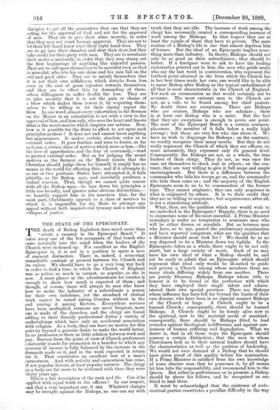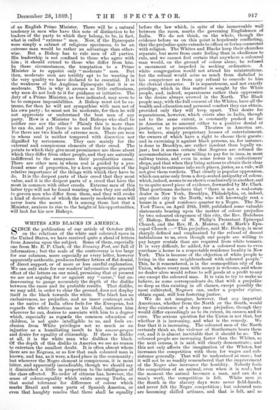THE STATE OF THE EPISCOPATE. T HE death of Bishop Lightfoot
does much more than " create a vacancy in the Episcopal Bench." It takes away one of the few occupants of that bench who came naturally into the mind when the leaders of the Church were reckoned up. For excellent as the English Episcopate is, it is not in a position to spare a man of eminent distinction. There is, indeed, a somewhat remarkable contrast at present between the Church and its rulers. We should have to go a very long way back in order to find a time in which the Church of England was so active, so much in earnest, so popular, as she is now. A mere glance at the advertisements for curates is enough to show how much is expected of them ; and though, of course, there will always be men who know how to make the industry of a subordinate a screen for their own indolence, yet the standard of clerical work cannot be raised among Curates without in the end raising it among Rectors. Everywhere services have been multiplied, sermons are more frequent, more use is made of the churches, and the clergy are found adding to their directly professional duties a variety of undertakings which have only an accidental association with religion. As a body, they can have no motive for this activity beyond a genuine desire to make the world better. In no profession is there so little relation between work and pay. Success from the point of view of Church preferment constantly stands for promotion to a benefice in which any increase of income is fully balanced by the increase in the demands made on it, and in the work expected in return for it. That constitutes an excellent test of a man's .earnestness. And with activity and earnestness has come, if not popular favour, at least popular interest. The clergy as a body are far more to be reckoned with than they were thirty years ago. This is a fair description of the rank and file. Can it be applied with equal truth to the officers ? In one respect, and that a very important one, it can. Whatever charges may be brought against the Bishops, no one can say with truth that they are idle. The increase of work among the clergy has necessarily created a corresponding increase of work among the Bishops. In that respect they are at least the equals of those they have to govern. The mere routine of a Bishop's life is one that almost deprives him of leisure. But the ideal of an Episcopate implies some- thing more than industry. In theory, Bishops should not only be as good as their subordinates ; they should be better. If a foreigner were to ask to have the leading ecclesiastics pointed out to him, the men who guide souls, who say the last word in controversies, who represent the farthest point attained in the lives which the Church has in her best times made her own, one would like to be able to name Bishop after Bishop as the typical embodiment of all that is most characteristic in the Church of England. Yet such an enumeration as this would certainly not be accurate. The most eminent men in the Church are not, as a rule, to be found among her chief pastors. No doubt there are exceptions. There are Bishops who are orators, Bishops who are scholars ; there is at least one Bishop who is a saint. But the fact that they are exceptions is enough to prove our point. The note of the Episcopal Bench is a certain common- placeness. No member of it falls below a really high average ; but there are very few who rise above it. We have no wish to disparage the Bishops ; on the contrary, we readily recognise their many merits. But they do not really represent the Church of which they are officers, or, more accurately, they represent only its general level. Consequently, the Bishops are not, as a whole, the true leaders of their clergy. They do not, as was once the case, set themselves to check zeal in others ; on the con- trary, they are very willing to give it full scope and ample encouragement. But there is a difference between the commander who bids his troops go on, and the commander who bids them come on ; and the majority of the English Episcopate seem to us to be commanders of the former type. They cannot originate ; they can only acquiesce in what is originated by others. It is to their credit that they are so willing to acquiesce ; but acquiescence, after all, is not a stimulating attitude.
What, then, are the qualities which one would wish to see embodied in the Episcopate? Happily, there is no need to enumerate some of the most essential. A Prime Minister nowadays is under no temptation to nominate men who will be either drones or scandals. But as between men who have, so to say, passed the preliminary examination and been reported competent, what are the qualities that a, Minister should most look for ? We should be in no way disposed to tie a Minister down too tightly. In the Episcopate, taken as a whole, there ought to be not only merit, but a large variety of merit. Each of us may have his own ideal of what a Bishop should be, and yet be ready to admit that an Episcopate which should represent that ideal only would be ill-suited to guide and govern a Church among whose members there are many ideals differing widely from one another. There are purely Diocesan Bishops, Bishops whose title to honour is to be found in the perfection with which they have employed their single talent and admin- istered their own special province. There are Bishops whose influence has been felt far beyond the limits of their own diocese, who have been in an especial manner Bishops of the Church at large. A Church ought to be a learned Church ; consequently, there should be learned Bishops. A Church ought to be keenly alive now to the spiritual, now to the material needs of mankind ; consequently, there should be Bishops fitted to lead crusades against theological indifference, and against care lessness of human suffering and degradation. What we desire is, that in all these ways the Episcopate should possess a certain distinction ; that the men to whom Churchmen look as to their natural leaders should have the characteristics as well as the position of leadership. We would not even demand of a Bishop that he should have given proof of this quality before his nomination. If a Prime Minister is satisfied from his own knowledge of some obscure man that he possesses it, by all means let him take the responsibility, and recommend him to the Queen. But either in performance or in promise, a Bishop should be above his fellows, and be recognised as one fitted to lead them.
It must be acknowledged that the existence of eccle- siastical parties constitutes a peculiar difficulty in the way of an English Prime Minister There will be a natural tendency in men who have this note of distinction to be leaders of the party to which they belong, to be, in fact, what is called " extreme " men. Now, if the Episcopate were simply a cabinet of religious specimens, to be an extreme man would be rather an advantage than other- wise. But a Bishop has to rule men of all parties. His leadership is not confined to those who agree with him ; it should extend to those who differ from him. In these circumstances, the temptation to a Prime Minister is to appoint only " moderate " men. But then, moderate men are terribly apt to be wanting in the very quality we have declared to be essential. It is the weakness of the Anglican Episcopate that it is so moderate. This is why it arouses so little enthusiasm, why men do not look to it for guidance or initiative. The duty of a Prime Minister, as here indicated, may seem to be to compass impossibilities. A Bishop must not be ex- treme, for then he will not sympathise with men not of his own party ; he must not be moderate, for then he will not appreciate or understand the best men of any party. How is a Minister to find Bishops who shall be neither one nor the other ? Plainly this is more than he can do, and yet there is no need for him to despair. For there are two kinds of extreme men. There are men in whom zeal is neither tempered with discretion nor dignified by seriousness. They care mainly for the external and conspicuous elements of their creed. The points to which they give most prominence are those about which they differ from other people, and they are naturally indifferent to the annoyance their peculiarities cause. There are other men in whom zeal is guided by a pro- found sense of proportion, by a keen appreciation of the relative importance of the things with which they have to do. It is the deepest parts of their creed that they most value, and it is the deepest parts of a creed that have the most in common with other creeds. Extreme men of this latter type will not be found wanting when they are called to govern men who differ from them, and they will evoke a kind of devotion of which the merely moderate man will never learn the secret. It is among these last that a Minister, anxious to rise to the height of his opportunities, will look for his new Bishops.



































 Previous page
Previous page